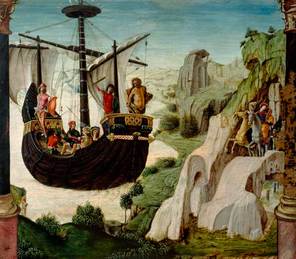ABSYRTUS
(Apsyrtus)

Argonauts in Colchis, Lorenzo Costa, 16th c.
John Bell
Bell's New Pantheon (1790)
ABSYRTUS, son of Aeetes, king of Colchis, by Hypsea, and brother of Medea and Chalcione, according to some; Apollonius makes him son of Asteride, a Scythian nymph. Medea, after having assisted Jason in carrying away the golden fleece, and accompanied him, was pursued by her father; but, to stop his pursuit, tore her brother Absyrtus, who went with her in pieces, and scattered his limbs on the road. Aeetes, perceiving the mangled members of his son, stopped to gather them up, by which means Medea effected her escape with Jason. Apollonius, in his Argonautica, ascribes the death of Absyrtus not to Medea, but to Jason.
Source: John Bell, Bell's New Pantheon; or, Historical Dictionary of the Gods, Demi-Gods, Heroes, and Fabulous Personages of Antiquity, vol. 1 (London: British Library, 1790).
Photo credit: Wikimedia Commons.



